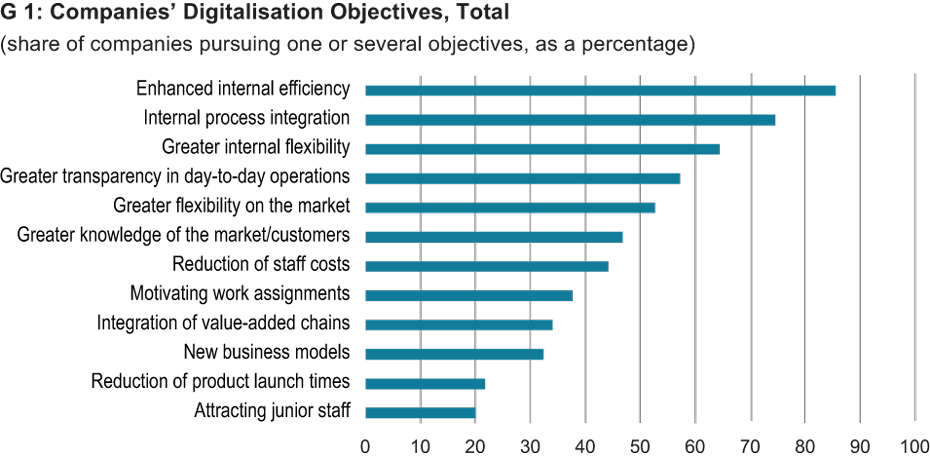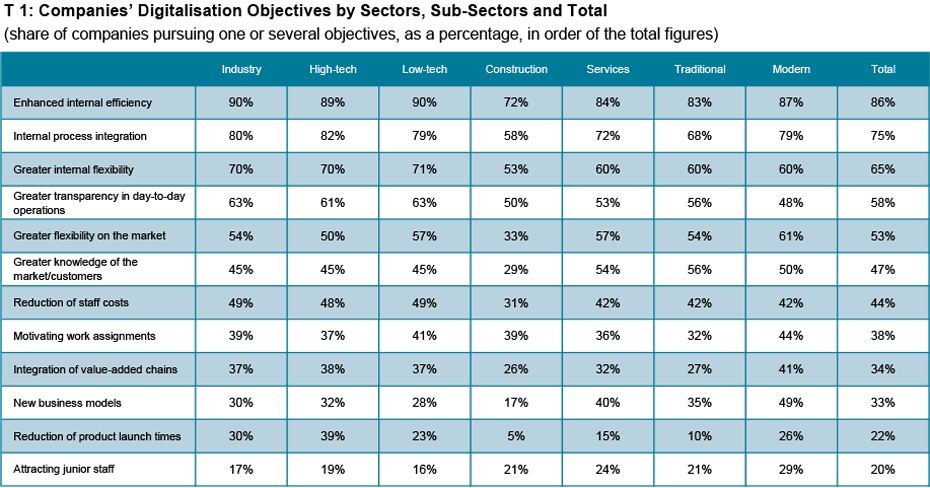Digitalisation (2/2): Enhanced Efficiency is Top Priority
- Innovation
- KOF Bulletin
Following the last Bulletin’s article on the skills employers look for in their staff, our second article on the level of digitalisation in Switzerland focuses on possible digitalisation objectives pursued by Swiss companies. It was found that companies specifically hope to raise efficiency.

In the context of a joint study (Bienefeld et al., 2018), researchers of the Chair of Labour and Organisational Psychology at ETH Zurich, the University of Applied Sciences Northwestern Switzerland (FHNW), and KOF investigated the objectives pursued by companies in connection with the digitalisation of their activities. They found that companies across all industries and sizes are primarily interested in raising internal efficiency, an objective that was stated by 85.5% of all respondents (see G 1).

The second and third most frequently stated objectives, internal process integration (74.6%) and greater internal flexibility (64.4%), also relate to internal company processes. External objectives, for instance greater flexibility on the market (52.7%) or greater knowledge of the market/customers (46.8%), were mentioned much less frequently. This came as a surprise given the manifold opportunities digital technologies offer when it comes to analysing market and customer knowledge (e.g. Big Data) (Bienefeld et al., 2018).
Companies also appear to have little interest (as yet) in the risk of disruptive technologies on the market and the associated need for enhanced agility, as suggested by the percentages relating to the objectives of pursuing new business models (32.4%) and reducing product launch times (21.7%). In the area of Human Resources, the objectives of reducing staff costs came in at 44.1% and creation of motivating work assignments at 37.7%. The first point has a bearing on the current debate about the risks of digitalisation leading to job cuts. However, descriptive survey analysis of the first part of this study (Arvanitis et al. 2017) suggests that any potential effects of digitalisation on staff numbers predominantly relate to staff members with low qualifications. Scores of companies, especially larger ones, report an increased demand for employees with better qualifications.
The objective of attracting top junior staff was mentioned with the lowest frequency, although social media (internal and external platforms) would offer ideal recruitment opportunities and as many as 77% of all companies are already actively using social media (see Arvanitis et al., 2017).
Construction industry shows little interest in digitalisation
Analysis of the different sectors displays a similar pattern in terms of the companies’ objectives. Depending on the individual industry, this pattern is either more or less distinct (see T 1). The construction industry stands out for pursuing all of the objectives much less frequently and virtually not pursuing the new business models and reducing product launch time objectives at all. Companies active in high-tech and low-tech industries and modern services show the strongest interest in the objectives most frequently pursued in the above overview (enhanced internal efficiency and internal process integration). Flexibility on the market and the endeavour to better understand the market/customers are predominantly pursued by modern and traditional service providers. On top of this, modern service providers are pioneers where the aims of creating new business models and creation of motivating work assignments are concerned.

Note
This text is an adapted version of the section “Companies’ digitalisation objectives” of the study entitled ‘Digitalisierung in der Schweizer Wirtschaft: Ergebnisse der Umfrage 2016, Teil 2: Ziele, Berufliche Kompetenzen und Arbeitsorganisation’ [Digitalisation of the Swiss Economy: Results of the 2016 Survey, Part 2: Aims, Professional Skills and Work Organisation] (2018) by Nadine Bienefeld, Gudela Grote, Irina Stoller, Toni Wäfler, Martin Wörter and Spyros Arvanitis, Irina Stoller, Toni Wäfler, Martin Wörter und Spyros Arvanitis. Link to the first part of this two-part series: “Digitalisation (1/2): Companies Consider Lack of Skills Among Staff to Be the Biggest Obstacle to the Spread of Digitalisation”
Bibliography
Arvanitis, S.; G. Grote, A. Spescha, T. Wäfler und M. Wörter (2017): Digitalisierung in der Schweizer Wirtschaft – Ergebnisse der Umfrage 2016, eine Teilauswertung im Auftrag des SBFI, KOF Studien Nr. 93, Zürich.
Bienefeld, N., Grote, G., Stoller, I., Wäfler, T., Wörter, M., Arvanitis, S. (2018): Digitalisierung in der Schweizer Wirtschaft: Ergebnisse der Umfrage 2016, Teil 2: Ziele, berufliche Kompetenzen und Arbeitsorganisation, KOF Studien Nr. 99, Zürich.
Contact
KOF Konjunkturforschungsstelle
Leonhardstrasse 21
8092
Zürich
Switzerland
Arbeits-& Organisationspsychologie
Weinbergstr. 56/58
8092
Zürich
Switzerland